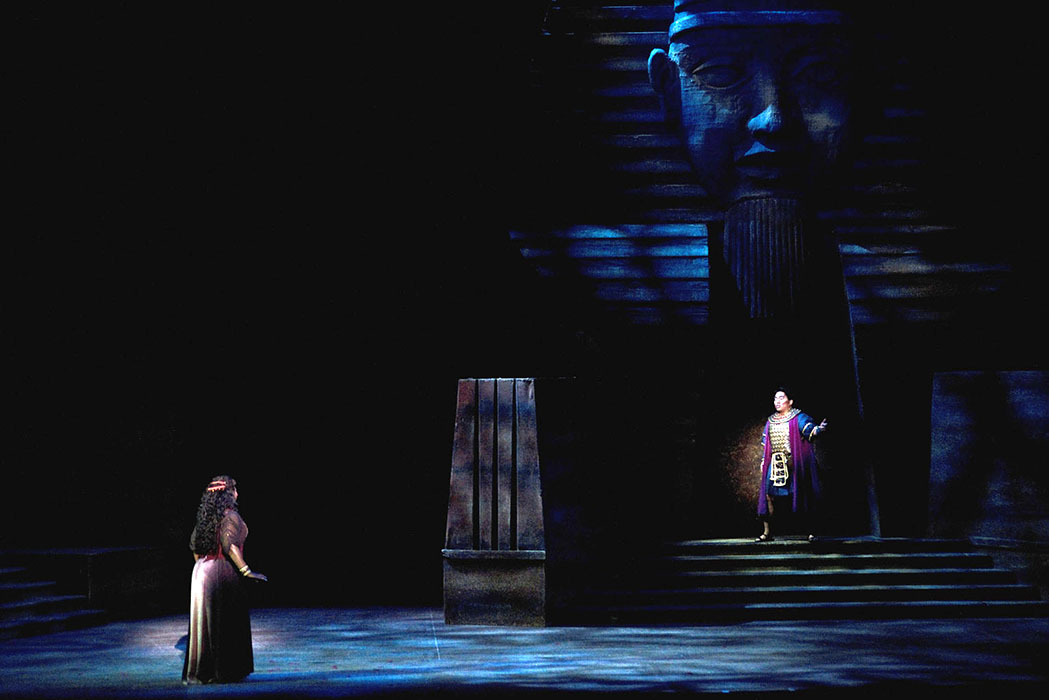It was probably inevitable that Giuseppe Verdi’s Aida would be Knoxville Opera’s choice to conclude the 2017-18 season—its 40th anniversary season. After all, it was to be a season designed to make a major statement for the opera company and simultaneously intrigue its audience with an upsizing in both talent and scale of production. Following a highly applauded gala concert in October that navigated through notable operatic excerpts, then a large, impressive production of Puccini’s Turandot in February, there really was no other operatic vehicle that could have satisfied the arc of the season other than Verdi’s 1871 work. However, the challenge for any company staging Aida is to satisfy the desire for a spectacle without allowing scale to overwhelm the musical and dramatic narrative, a narrative that is essentially a fairly simple operatic love triangle. Was the challenge met? Yes, resoundingly and thrillingly so, thanks to some exceptional casting and the extremely successful integration of a large set populated with a legion of 175 chorus members, dancers, extras, onstage trumpeters, offstage instrumentalists, and a full Knoxville Symphony Orchestra in the pit under the direction of Maestro Brian Salesky.
Of course, in Knoxville, that kind of size and scale means that the venue is undoubtedly the Knoxville Civic Auditorium, necessarily overruling any objections to the hall’s infamous mushy natural acoustics. The Civic’s stage accommodated a large set acquired from New Orleans Opera that served as a vast palette for stage director Dean Anthony, who skillfully maintained an artful compositional balance between dramatic storytelling for the principal singers, and logistical storytelling for the chorus, dancers, and extras.

Thankfully, Salesky selected a cast of singers that not only possessed big voices, but who also had the vocal and dramatic subtlety to sell the romance with passion and emotion in a large house. In the title role of Aida was soprano Michelle Johnson, a singer whose power and clarity were perfect for the character. Johnson’s familiarity with the role showed up here as confidence in painting an emotional portrait in motion, riding the rhythm of feelings from elation to despair. Her “Ritorna vincitor” in Act I was a vivid statement of anguish, while the Act III “O patria mia” was a particularly haunting aria, supported by a lusciously played oboe accompaniment.
Vying for the head of the big voice department was tenor Dongwon Shin in the role of Radamès, the Egyptian captain and hero in love with—and loved by—Aida. Shin possesses a vocal instrument of surprising power which at times seemed to get away from him in terms of penetrating volume. However, Shin mastered contrasts with ease and with a reasonably attractive clarity; his opening aria “Celeste Aida” was nicely handled despite its difficulty, while his Act IV tomb scene with Aida was a careful study in vocal control.
A pleasant surprise came from the third side of the romantic triangle: mezzo-soprano Sabina Kim in the role of the princess Amneris, daughter to the Egyptian king, who is also in love with Radamès. Kim, who replaced a previously announced singer just before rehearsals began, had lovely power throughout her range that demanded attention and a true crispness often absent in mezzo voices. On the dramatic side, I found Kim’s Amneris to engender a bit more sympathy than most interpretations. She wavers in her jealousy, clearly torn between love of country and love for Radamès, in a conflict not unlike Aida’s situation.
I must admit that my grousing about the Civic’s acoustics lost a bit of weight when baritone Scott Bearden appeared on stage in the role of Amonasro, the Ethiopian king. A familiar face and voice for Knoxville Opera audiences, Bearden is not only a superb and versatile operatic actor, but his compelling vocal power, coupled with an uncanny beauty of tone, clarity of diction, and ability to project, clearly elevated the character to a dominant position in this Aida.
The rewarding depth of Salesky’s casting extended throughout the secondary characters. Adding an impressive voice was Kevin Thompson in the role of Ramfis, the chief Egyptian priest. Tenor Darius Thomas confirmed that there are no small roles with his attention-getting Messenger in Act I. John Dominick III offered a magisterial King of Egypt. Caitlin Bolden sang a lovely offstage voice of the High Priestess, Termuthis.
A delightful surprise came from Lisa McKee’s choreography and from female dancers from her Go! Contemporary Danceworks. Appearing in multiple scenes, the eye-catching choreography was physical, intriguing, and marvelously matched Verdi’s score in terms of character and design. The ensemble’s professionalism was impressive, a quality that speaks to training and motivation.
At 70 strong and appearing as a variety of groups—Egyptians, priests, soldiers, Ethiopian prisoners—the onstage chorus (Knoxville Opera Chorus and members of the Knoxville Choral Society) made a notable impact in the production, almost feeling like a single individual character at times due to a remarkable cohesive ensemble togetherness.
I believe I was told that this was the first Aida for Maestro Salesky’s career, certainly the first in his 13 years at Knoxville Opera. Living within the physical and financial limitations of regional opera is not easy, so a year of celebration and indulgence was certainly in order in this, the company’s 40th. The 41st season for KO begins in October with Puccini’s only comedy, Gianni Schicchi, followed in February by the awaited return of Lucia di Lammermoor, capped off with a special outdoors production of Cavalleria Rusticana in May of 2019 .









Absolutely superb!